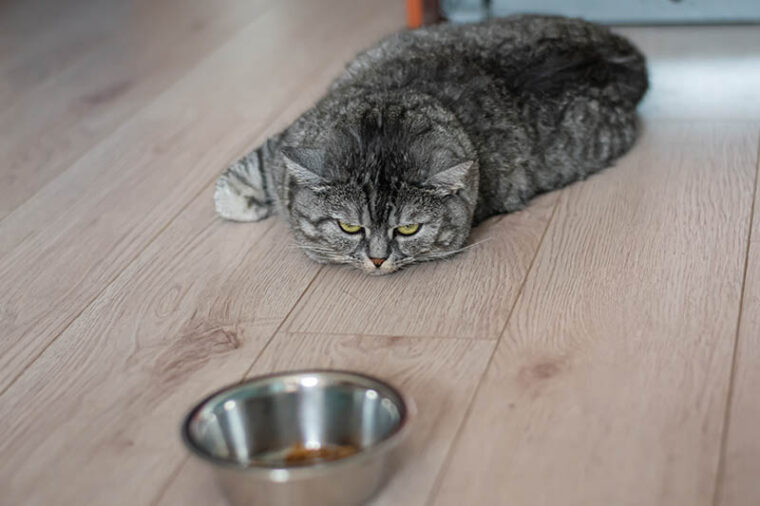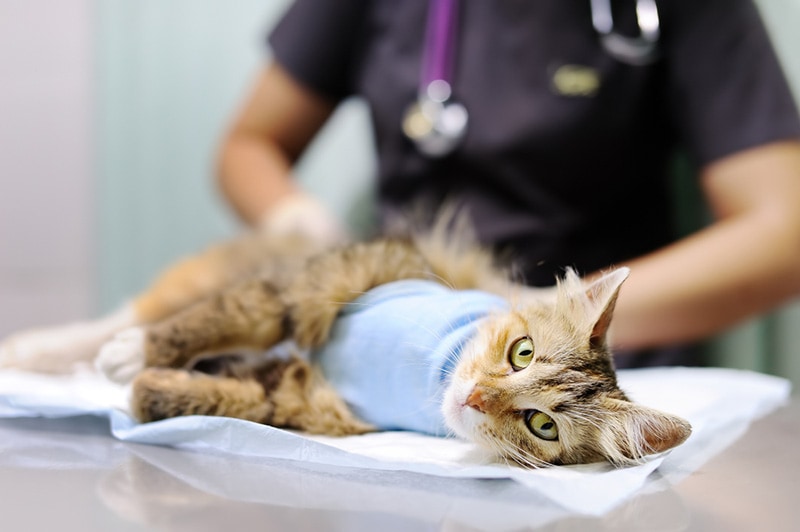
Click to Skip Ahead
When humans are interested in weight loss, many experts will recommend intermittent fasting. This is when a person will only eat between certain hours of the day, typically for an extremely short period. This is followed by upwards of 16+ hours of fasting, or not eating. Unfortunately, some may want to extrapolate that practice to their cat and try to fast them to lose weight. However, fasting your cat, or leaving them without food for extended periods can have serious side effects on their health.
In this article, we’ll discuss why you should never fast your cat, what can happen if you do, and some better feeding habits to get into so that your cat may lose weight and live a healthy life.
What is Fasting?
Fasting occurs when an animal goes for extended periods of time without food. With cats, many people will just fill a bowl and walk away, sometimes not checking the bowl for a day or so to refill it again. This is especially common when an owner goes out of town for a few days. They may fill up the cat’s bowl, leave town, and assume that over the next 3–4 days the cat will slowly eat what they’ve left.
However, your cat doesn’t know when you’re coming back. For all they know, they think they hit the jackpot and are getting an extremely large dinner. Your cat may eat the entire bowl in one or two sittings, and then be left without food for days.
Other times, your veterinarian may have told you that your cat is overweight and could afford to drop a few pounds. Because your physician may recommend something called intermittent fasting for your weight loss journey, you may assume that this will be beneficial for your cat as well. So, you only feed your cat one small meal a day, and then withhold food until the next day at the same time. This is not recommended for cats—let’s discuss why.

What Might Happen If I Fast My Cat?
Cats are prone to getting a condition called fatty liver disease, or hepatic lipidosis, if they are fasted. Fatty liver disease is unique to cats, as we do not see the same phenomenon in dogs. When a cat goes more than a few days without eating, their body will start to rapidly break down fat to supply energy and nutrients. This breakdown will eventually become too much for the liver to process. The liver will therefore start to store that fat in and around the individual liver cells, further complicating the process.
Fatty liver disease is most common in already overweight or obese cats. All they need is a few days without food for this to occur. Often a cat will have another underlying condition prior to not eating such as kidney disease, cancer, IBD, or diabetes. However, it can also occur secondary to leaving your cat alone for a few days and them choosing not to eat out of stress, or because they’ve already eaten the bowl of food you left them.
What Happens If My Cat Gets Fatty Liver Disease?
Hepatic lipidosis, or fatty liver disease, is a very difficult disease to manage. Your veterinarian will want to perform bloodwork, an ultrasound, and often take samples of the liver to diagnose the condition. Your cat will then need to get on aggressive nutritional support for a few months to return the liver to its normal function.
However, the trick is getting said nutrition into your cat. Once your cat develops a fatty liver, they are often very nauseous, vomiting, and have no desire to eat. Even if they do, they will frequently vomit everything up. Therefore, a feeding tube is placed to provide consistent, measured food to your cat, while also providing medications to help with liver function and nausea.
Feeding tubes need to be placed by a veterinarian and can be difficult to manage. Taking care of a cat with hepatic lipidosis takes dedication on both the owner’s and the veterinarian’s part. Weeks of food preparation, measuring, feeding, and repeat bloodwork need to be performed while your cat is nursed back to health. Unfortunately, many cats may pass from the disease as their liver never fully recovers.

But What About Fasting Before Surgery?
Your veterinarian may recommend a short fast for your cat prior to surgery such as a spay or neuter. This is only completed overnight. In other words, your cat can have a normal dinner the night before their surgery and then breakfast is often withheld the day of their procedure. However, if your cat has an underlying disease such as diabetes, your veterinarian may still want you to feed a small meal in the morning before surgery.
Often, surgical procedures are completed in the morning at your veterinarian’s office so that your cat can be offered food upon recovery in the afternoon. If your cat is obese and has to have surgery, speak to your veterinarian about concerns with a prolonged fast.
Helping Your Cat Lose Weight
As discussed above, fatty liver disease occurs most commonly in already overweight or obese cats. Therefore, while it may seem counterintuitive, you want to make sure your overweight cat continues to eat during regular meal times. The first step in getting your cat to lose weight is measuring their food. Too often a bowl of unknown size and quantity is filled once or twice a day for a fat cat to happily enjoy. You may have no idea how much the bowl holds and how many calories your cats are actually consuming. Use a standard-sized measuring cup to first measure your cats’ food.
Don’t heap the scoop! A small heap for both breakfast and dinner can easily add an additional 1/4–1/2 cup of unneeded calories. Start with two regimented meals a day, despite the inevitable grumbling your cat will do.
Once you know how much food your cat is actually consuming in a day, speak with your veterinarian about the amount and make a plan moving forward. It may be as simple as cutting back by small amounts every few months until your cat gets down to an ideal weight. Your veterinarian may also recommend substituting canned food for dry kibble due to the increased water content. Your cat may love the occasional canned meal and unknowingly be consuming fewer calories than a bowl of dry food.
Still, if your cat continues to gain weight or is unable to lose weight, there are some great prescription weight-loss foods on the market today for your cat. Speak with your veterinarian about what they recommend.
Keep in mind that home cooking for your cat may also be dangerous. Cats need very specific amounts of protein, water, and certain nutrients such as taurine for organ health. If any of these amounts are off, your cat may suffer serious health consequences. Cats are also obligate carnivores which means they require meat to survive.
Conclusion
Fasting your cat, whether on purpose or accidentally if you go out of town, is never recommended. Cats can be prone to developing a condition called hepatic lipidosis, or fatty liver disease, after only a few days of not eating. This is more common in already overweight or obese cats. Fatty liver disease can be difficult, expensive, and time-consuming to treat and many cats will pass away from the disease as their liver never recovers.
If you are going out of town, ask a pet sitter or a friend to stop in at least once a day to clean the litterboxes and offer fresh food and water for your cats. If you are trying to get your cat to lose weight, start by measuring their food and feeding a recommended amount twice daily. Always seek veterinary advice about the type and amount of food you are offering to make sure your cat is getting all of the recommended daily nutrients for optimum health.
See Also:
- Cavapoo vs Mini Goldendoodle: Differences Explained (With Pictures)
- Labradoodle vs Goldendoodle: The Differences (With Pictures)
Featured Image Credit: Kitirinya, Shutterstock







